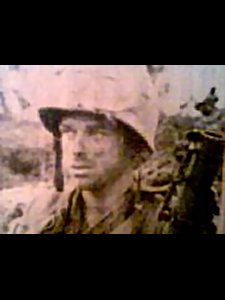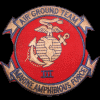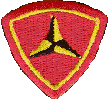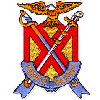| |
|
|
|
Robert John Enedy
Sergeant
H CO, 2ND BN, 4TH MARINES, 3RD MARDIV, III MAF United States Marine Corps San Diego, California March 26, 1946 to April 30, 1968 ROBERT J ENEDY is on the Wall at Panel 53E, Line 12 See the full profile or name rubbing for Robert Enedy |

 |

|



| |
I do not fear an army of lions, if they are led by a lamb.
|
|
Sergeant Robert J. Enedy was my great uncle, my grandmother's brother. He was killed in Vietnam. He joined the US Marine Corps in San Diego, California, and is buried in Long Beach, California. He was killed during Tet Offensive in 1968. If anyone has any information on my great uncle Robert, please email me.
Thank you, Denise |
|
Many thanks to this site for this chance to share information about my brother, and special thanks to Ed Maspero and Clay Marston for their Memorials. I hope there will be many more from his friends as they bring great comfort to his family. I would love to correspond with anyone who knew him. Robert graduated from Fountain Valley High School in 1964. He lived in Fountain Valley with his parents and younger sister, Robert, Nellie, and Kimberly. He drove to San Diego to enlist. The last time I saw my brother was at Camp Pendleton when he took off for Viet Nam. I still have his letters. When he first went over, he was very gun ho; in his last letter he said, "I want to come home." When he did come home, his friend Stan, who was also a Marine, escorted him. Stan stood by him until he was buried, his friendship was the most beautiful I have ever seen. Robert wanted to live; he was going to have a wonderful life. That life was taken from him, most horribly taken from him with a stomach wound. He could have been evacuated and perhaps saved, but he directed that his men leave first. His friend, Ed Maspero, wrote this about him:
I hope Robert knows how much he is loved, by his men, and by his family. He was an only son, an only brother, and he will always be missed. We are so very proud of him, and so very sad.
Paula Mcgee
From his half-sister, Paula Mcgee paulamcgee@sbcglobal.net |
Notes from The Virtual WallIn May of 1968, the North Vietnamese launched what has been called their "Tet II" offensive, striking 119 provincial and district capitals, military installations, and major cities including Saigon. Unlike Tet I, which was primarily a Viet Cong uprising, Tet II was almost entirely an NVA affair.The battle of Dai Do actually began on April 30 with the ambush of a US Navy utility boat by elements of the 320th NVA Division at the junction of the Bo Dieu and Cua Viet rivers. Since Battalion Landing Team 2/4 was in the area, it was ordered to eliminate the threat to the crucial waterway. "The Battle of Dai Do was a fierce and bloody struggle between an understrength Marine battalion landing team (2nd Bn, 4th Marines {BLT 2/4}) and major elements of the 320th North Vietnamese Army (NVA) Division during three hot, humid spring days in 1968 (30 April - 3 May). I was privileged to command those magnificent Marines and Sailors who stopped the well-equipped 320th in its tracks on the north bank of the Bo Dieu River and drove it back toward the Demilitarized Zone (DMZ).Faced by three Regiments of the 320th NVA Division, BLT 2/4 was forced to fall back to defensive positions north of the river, but they stopped the enemy attack. NVA reinforcements were turned back by the Army's 3rd Bn, 21st Infantry, Americal Division, who occupied blocking positions at Nhi Ha to the northeast. The NVA attempt to open an invasion corridor into South Vietnam had failed. The "Magnificent Bastards" of 2/4 Marines and the 3/21st Infantry had saved the day, for if they had failed the NVA would have been free to overrun the major supply bases at Dong Ha and Quang Tri and the entire DMZ defenses would have been undermined. However, the cost had been high. The Marines suffered 81 dead and another 297 seriously wounded, while Army forces at Nhi Ha sustained 29 deaths and 130 wounded. But the enemy suffered even greater losses - not only did the NVA fail to achieve their objective, they also left 1,568 bodies on the battlefield. After regrouping, 2/4 Marines were able to field four rifle companies of 1 officer and 40 men each. |
| Contact Us | © Copyright 1997-2019 www.VirtualWall.org, Ltd ®(TM) | Last update 08/15/2019. |